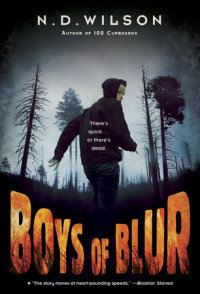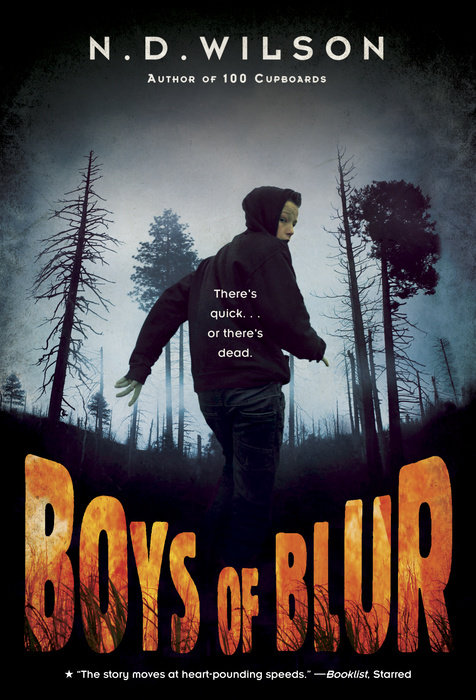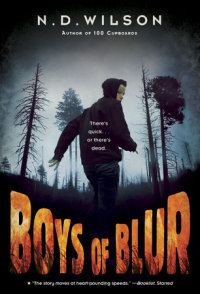Boys of Blur
Fans of Jerry Spinelli's Maniac Magee and Louis Sachar's Holes will enjoy this story about a boy and the ancient secrets that hide deep in the heart of the Florida everglades near a place called Muck City.
When Charlie moves to the small town of Taper, Florida, he discovers a different world. Pinned between the everglades and the swampy banks of Lake Okeechobee, the small town produces sugar cane . . . and the fastest runners in the country. Kids chase muck rabbits in the fields while the cane is being burned and harvested. Dodging flames and blades and breathing smoke, they run down the rabbits for three dollars a skin. And when they can do that, running a football is easy.
But there are things in the swamp, roaming the cane at night, that cannot be explained, and they seem connected to sprawling mounds older than the swamps. Together with his step-second cousin "Cotton" Mack, the fastest boy on the muck, Charlie hunts secrets in the glades and on the muck flats where the cane grows secrets as old as the soft earth, secrets that haunted, tripped, and trapped the original native tribes, ensnared conquistadors, and buried runaway slaves. Secrets only the muck knows.
An Excerpt fromBoys of Blur
One
MUCK
Out in the muck, where a sea of sugarcane stops and swamps begin, sitting beside a lake bigger than some countries, there is a town called Taper.
Taper has only one hill, a flat-topped mound just above the northern edge of town, ringed by cane. On that mound is an old white church with nothing but a stump where its steeple used to be before it was torn away by some long-forgotten hurricane. As for the church bell, it crashed through the floorboards and settled into the soft ground below. It’s still down there, under the patched floor, ringing silence in the muck.
Most Sundays, the little church sees a few cars, and a minister under a wobbling ceiling fan preaching at old men and women who have heard it all before. But when this story starts, one of those men has moved right on beyond old and straight into dead. There’s a whole herd of cars parked below that white church, and a whole herd of people standing around the rusty iron fence that cages in the graves.
The dead man’s name was Willie Wisdom. And if he hadn’t died, a boy named Charlie Reynolds might never have set foot on that mound in Taper, Florida, and this story would already have run dry of words.
Charlie Reynolds stood with his stepfather and his mother and his fidgeting little sister near the front of the crowd. From where he was standing, he could see loose black dirt mounded up on a tarp, ready to fill in a hole. He could see one end of the long box that held a man.
His neck itched. So he scratched it.
Charlie was not a boy who usually wore suits. And his neck wasn’t the only place crawling with itches--just the worst of them. He had brown hair that went blond in the summer, a cluster of freckles on his nose that multiplied like weeds in the sun, and gold flecks in his hazel eyes in every kind of weather.
Normally, he wore old T-shirts and heavy shorts with deep pockets that were empty when he left the house in the morning and full when he returned at night. While he had a closet full of clothes and a dresser overflowing with shirts and pants that still smelled like store, he never touched them. He dressed from the laundry basket at the foot of his bed, and in the laundry basket he always found a T-shirt and a pair of shorts. On cold days, he added a raggedy hoodie that had belonged to his father.
Charlie hadn’t worn a suit since his mother’s wedding five years ago. He’d only been seven then, and he’d hated it, but he’d understood. Without the suit he couldn’t hold the rings, and his mother had really, really wanted him to hold the rings.
For a moment, Charlie tried to pay attention. He looked at the flush-faced minister beside the grave. A sweaty roll of neck was bulging above his ministerial collar. For some reason, the man was talking about gardening.
Charlie couldn’t listen. Not with the Florida sun shining and the wind rattling through miles of sugarcane fields and itches dribbling down his neck and in between his shoulder blades.
Not while he was sinking.
Charlie took a step back and stared at where he’d been standing--two wet footprints dented the turf on the hilltop. His stepfather’s feet weren’t making dents, they were making craters. Charlie leaned on one foot and bounced, testing just how far he could sink into the turf.
A hand landed on his shoulder and Charlie looked up.
Charlie’s stepfather, Prester Mack, knew how to wear a suit. Big square shoulders, brown skin a little slick in the sun, he looked down at Charlie and shook his head no more than a centimeter, then let go of Charlie’s shoulder. Charlie knew his stepfather’s football knees would be hurting, but Mack was tough, and the old man sealed in the box ready to go down into the hole had been the closest thing to a father Mack had ever had.
The minister was talking about bones now, a whole valley full of them. More than in the muck, he said. More than in a thousand fossil beds. His voice sounded like he was almost done.
Charlie inhaled slowly and the air tasted charred. He turned. A tower of smoke was roiling up from the fields.
Some people didn’t care that old Coach Wiz had died. They had sugarcane to burn.
Three women sang.
Six big men stepped forward and lowered an old coach into the ground.
Willie Wisdom, foster father to twenty-seven, head football coach of the Taper Terrapins for thirty-two years. Rest in peace.
The crowd shifted and frayed around the edges. Men and women were hugging Mrs. Wiz where she sat by the grave in a white plastic chair. People were setting food on tables in the shade beside the church. A man was clattering glass Coke bottles into a little plastic swimming pool full of melting ice.
“You ever drink one from a bottle?” Charlie’s mother asked. He looked up at her and shrugged.
“If you had, you’d remember.”
Natalie Mack smiled at her son, but the smile didn’t reach her eyes. Real smiles brought creases to the corners. Her look bounced away through the crowd before taking in the tower of smoke and then returning to Charlie.
“Mom?” Charlie asked.
His mother didn’t answer. Standing barefoot in the grass, she dangled her high heels from one hand and Charlie’s sister, three-year-old Molly Mack, from the other. Today and every day, his mother’s hair was pulled back into a high doubled-over ponytail, but it seemed blonder than normal above her black dress.
As Charlie watched her eyes, he felt something tighten in his chest.
Charlie had been four when he’d learned how his mother’s eyes looked when his father was on his way home. He’d been four the first time his mother hid him behind pillows on the top shelf of a closet. Five the first time he’d called the police. Five when he’d felt his first broken rib. Five when he’d learned to keep his face empty and five when his mother had loaded his backpack, taken his hand, and led him out the front door of their little house, past the rusted swing set, past his bike and his sandbox and an old worn football in the grass, and down the cracked sidewalk toward the bus station, never to return.
For a while after that, his mother’s eyes had always looked the way they did when Charlie’s father was on his way home, like he might be waiting around every corner, in every motel, in every restaurant, or walking behind them on every street.
Charlie had been six when his father had caught up with them, but by then, Mack had been there, too. Mack had changed everything.
“Mom?” Charlie asked. “What’s wrong?”
Natalie sighed. Her eyes were on Mack, where he was laughing with three other old football men in the crowd. She shook her head. “Nothing.” She smiled again, forcing eye creases this time. She cocked her hip and tugged Molly up onto it. “We’ll be leaving soon, so make sure you eat something.”
Charlie nodded. Molly looked at him, widening her brown eyes and making a big fake surprised face. Then she curled her lip into a snarl--her very best monster face.
Charlie gasped silently in fear. His sister laughed and threw her weight at the ground until her mother set her back down.
“I know you, Charlie,” his mother said. “Wander if you like, just don’t go far.” Molly grabbed her mother’s hand and began to drag her away. “And eat something!”
Charlie ignored the food tables. He slipped past church ladies in hats, men in suits, and clusters of boys slouching in red and white jackets. Each jacket had a football patch on one shoulder and a nickname on the back. Charlie saw ROCKET and SLIDE, J.TAG and WEAZEL. Free of the crowd, he moved through the taller grass, down the shallow side of the mound until only a narrow ditch in the black silt held him back from the cane fields.
The sugarcane looked like giant grass, bundles of green sticks taller than men tufted with long dry leaves like scythe blades. Separated by narrow, dark gaps, the rows marched away beneath the quiet blue sky. Not far from where Charlie stood, the sky’s belly was rough with swamp trees. The fields and the trees both ended at the foot of a steep grass-covered dike--an earth wall taller than the white steepleless church and its mound combined.
A breeze slid around Charlie and on through the cane. The air was warm, but the field shivered like an old man with a chill.
Charlie looked at the sky, held up by nothing more than the column of smoke he’d noticed during the service. The flats were wide open, but he still felt strangely enclosed. He felt like he was standing on the bottom of a deep hole, a hole so wide the sky came all the way down inside it.
He didn’t mind.
Charlie was in the cane where his stepfather had been raised and played his first football. Over the dike and across the water, he knew he would find more cane and the town of Belle Glade, where his real dad had been raised and played his football.
Both of his fathers had roots in the muck. Maybe Charlie did, too.
“Hey,” a boy said behind him. “I guess we’re some kind of cousins.”
Charlie turned, squinting against the sun. The boy was thin, black, and about Charlie’s height. He was wearing a creased red tie with an untucked dress shirt, canvas sneakers, and jeans. His hair was short, his eyes were big, and his smile was wide.
“I’m a Mack,” the boy said. “Your stepdad is my pop’s coz. So you and me are, too.”
“Not really,” Charlie said. “That would make us, like . . . step–second cousins.”
The boy shook his head. He took one step and jumped, gliding over the ditch and landing lightly in the cane field.
“Nope,” he said. He stripped the leaves from one of the cane stalks and snapped about a foot from the top. He broke it in two over his knee. “Cousins is cousins.” He tossed one of the pieces to Charlie. “Try it.”
Charlie examined his cane. Where it was broken, the end was gritty and wet with what looked like sap. He nibbled at a green corner. It tasted like sugar. Tiny bits of cane grit crept across his tongue.
“It’s sweet,” he said.
“Sweet?” The boy grinned. “Naw! Not sugarcane.” He laughed, gnawed at the end of his own hunk, and then pointed it at Charlie. “Call me Cotton. Everybody does. I already know you’re Charlie. I even know that your pops was Bobby Reynolds from Belle Glade who went to jail, but just about everybody knows that. You go to school?”
Charlie nodded.
“I’m homeschooled. My mom’s crazy for books. Stacks and stacks of books I’m supposed to read and that’s about it. And I can’t play football.” He tapped his sugarcane against a wide smile. “But I will. Next year I’ll play. You play football? You fast, Charlie Reynolds?”
“Fast enough,” Charlie said. “But I’ve never played.”
Cotton exhaled disbelief. “You’ve got Bobby Reynolds for a pop and Prester Mack for a step, and you don’t play?”
“Not yet,” Charlie said. He prodded the sticky end of his sugarcane with a fingertip.
“But you will?”
Charlie shrugged. “It’s my dad’s sport. Both my dads.”
Cotton chomped on his stick, studying Charlie. Finally, he dropped it in the trough.
“You scared of snakes?” Cotton asked.
Charlie shook his head.
“Good. Come on, I’ll show you something.” Without waiting for an answer, Cotton began running along the edge of the field, rattling through the leafy fringe.
Charlie dropped his cane hunk and hopped the ditch. When he landed, the damp muck rose around his feet. The first steps were the hardest but none of them were easy, and Cotton kept going faster. Charlie fought to stay in his new cousin’s wake, thumping his shoulder against cane and turning his face away from brittle, slashing leaves, tugging every step up from the sucking ground.
After forty yards, Cotton suddenly veered, disappearing into the wall of cane.
Charlie followed. Cotton had turned into a narrow dirt road exactly one truck wide. The cane leaned in on both sides.
“Hey!” Charlie shouted. “Where we going?”
Cotton laughed and kept moving. His feet were lighter than Charlie’s, barely touching the ground. Where Charlie planted and pushed, Cotton quick-stepped, floating into the air, gliding between the tire tracks and soaring over puddles. Charlie was quick enough, and he had never been clumsy, but trailing Cotton made him feel like a bulldog puffing after a greyhound.
Cotton turned again, and this time the road ran beside a ditch full of black water. Up ahead, something that looked like a busted old tire slid off the bank and splashed into the ditch.
Charlie wanted to stare at the water and get a better look at his first gator, but Cotton was still moving.
One more turn, and then trees. Cotton slowed and stopped. Charlie staggered up beside him, wiping his face on the sleeve of his suit coat. He was breathing hard, grass cuts stung his hands, and at least one blade had nicked his face. Cotton didn’t seem to be breathing at all.
A narrow grass strip ran between the cane field and a deep canal. On the other side of the canal, thick swamp forest overwhelmed the bank. Ahead, a three-foot-high mound ran out of the swamp, bridged the canal, and disappeared into the cane. Swamp brush and scraggly trees crossed the canal on the mound’s back and even grew out in the cane--a finger of wild stretching into tamed fields.
“This is it?” Charlie asked. “This is what you wanted to show me?”
Cotton’s eyes were hooded. “The trees have been creeping,” he said. “A lot longer than I’ve been alive. The mound has a stone core--tractors can’t till it.”
Cotton scrambled onto the mound. Charlie followed, grabbing slender trunks as he did. The ground was suddenly firm beneath his feet and with just that little bit of elevation he could see over the cane--the narrow mound ran through the field directly toward the little white church on its hill.
Cotton was moving again. Charlie turned and followed him along the top of the mound toward the swamp.
“Old shacks back in there,” Cotton said, pointing toward the trees. “Shacks for cane workers--Haitians mostly. Now they just use tractors.”
Cotton stopped over the middle of the canal, before they reached a wall of looming cypress trees slung with vines and bearded with moss. Charlie saw a snake on the far side slip down into the black water. The mound didn’t just bridge the canal, it worked like a dam. On one side, a murky pool spread back into the trees, surrounding dozens of trunks. A tongue of water slid through a deep notch in the top of the mound and ran down into the canal on the other side. Cotton hopped the thin stream and crouched down.


